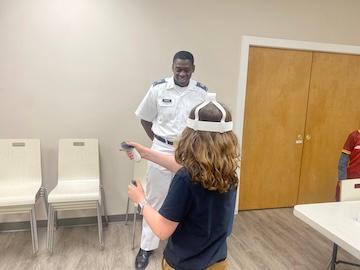Computer and Information Sciences
The VMI CIS program provides cadets the opportunity to experience the whole lifecycle of modern computer software systems from requirements analysis and representation to system and software design, development, and maintenance.
We also provide education with rigorous experiential learning in computer security, human-centric computing, and product development of online and mobile platforms. The program provides a solid foundation in the general areas of CIS including programming, computer architecture, algorithm design and analysis, database design and analysis, networking, information retrieval, software engineering, human-computer interaction, and ethical issues in computing.
The opportunity to accomplish advanced study under the direction of a faculty member is a required experience in a two-semester capstone.
MISSION
The Department of Computer and Information Sciences (CIS) is an evolutionary learning laboratory, rooted in the VMI mission, dedicated to preparing engaged learners endowed with computational thinking, knowledge, skills, and abilities to address real-world problems. We emphasize excellence in teaching and provide a dynamic program integrating teaching, scholarship, service, and cadet development. Our program is driven by an engaged faculty and innovative Computer and Information Sciences curricula with pervasive extensive practice. Rooted in the VMI mission, CIS aims to graduate the next generation of cyber leaders as citizen soldiers with the character, honor, acumen and knowledge to recognize and affect change; navigate ambiguity and surmount complexity; celebrate and benefit from diversity; and motivate and inspire teams to create useful societal and economic value.
VISION
To be recognized as the Cyber Leaders program preparing citizen soldiers as problem solvers; applying Computer and Information Sciences knowledge, skills and best practices, and transcending traditional disciplinary boundaries, to develop appropriate user-centric solutions to responsibly invent a better future and ethically lead the new "Intelligence Revolution."
Preparing for Success: Program Educational Goals
Due to the knowledge and skills acquired in any of the computer science tracks, we expect that cadets within a few years of graduation will have or attain the following career and professional accomplishments:
- Those employed in government or industry and focused on technical accomplishments will demonstrate professional advancement by promotion or other recognition of their computing knowledge and skills.
- Those employed by government or industry and focused on leadership will demonstrate professional advancement through expanded leadership responsibility based on their acquired computing knowledge and skills.
- Those who pursue additional formal education related to computing or management thereof, will either directly or soon after graduation, will have completed or be near completion of a graduate degree or other technical certification.
- Those who pursue career paths or formal education unrelated or tangential to their degree program will have applied their skills, including analytical problem solving, communication and independent learning, towards a new career or discipline.
- Will have demonstrated life-long learning skills and adapting to emerging markets and technologies.
- Will have embraced high personal and professional standards of conduct, citizenship, and service.
Degrees and Programs
Major(s): Computer Science
Degree(s): Bachelor of Science (B.S.).
Minor(s):
DEGREE TRACKS
CIS is unique among the academic departments at VMI, offering distinct bachelor's degree tracks focused on the top specialties in computer and information science.
Each track is designed to provide extensive training in techniques and strategies related to the overarching topic, preparing cadets for the next step of their academic and/or professional careers.

Cybersecurity
Graduates of this track will be well placed for entry into graduate school and/or public or private sector employment in positions including cybersecurity analyst, network engineer, systems administrator, penetration testing, cybersecurity engineer, and cybersecurity consultant.

Information Technology
Graduates of this track will be well placed for entry into graduate school, and/or public or private sector employment in positions including systems analyst, systems administrator, network administrator, database administrator, information technology support specialist.

Theory and Application
Graduates of this track will be well placed for entry into professional or graduate school and/or into public or private sector employment in positions including software engineer, software developer, programmer analyst, computer systems engineer, computer scientist, and web/mobile application developer.
CIS in the News
Find out more about the department's cadets and faculty in recent VMI news.

From VMI to Private Equity: Warner Collier ’24
Business and computer science were two industries that Warner Collier ’24 saw opportunity in. Coming to Virginia Military Institute, he wanted to cast as wide of a net as possible, which brought him to major in economics and business, with minors in computer science and cybersecurity.

Students Exposed to Cutting-Edge Cyber Technology Through Outreach Program
The Cyber Defense Laboratory (CyDef) at Virginia Military Institute, has developed a program with educational institutions to foster knowledge and interest in cutting-edge technology fields among high school and middle school students.
.svg)
.png)